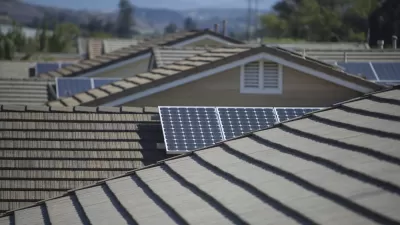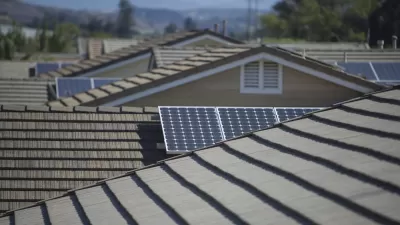Debuted in 2015, Google's Project Sunroof is designed make it easier for homeowners to go solar. Now the tool is harnessing peer pressure to "create a social norm" around solar.

When we first covered Google's Project Sunroof, it was already an ambitious project with an optimistic goal: making as easy as possible for homeowners to consider the rooftop solar option. Two years in, Robinson Meyer writes, the tool has expanded its prerogatives even further.
"Project Sunroof will now not only inform users how much sun hits their roof, or how much solar panels would save them per month, but also which of their neighbors have taken the plunge first."
Project Sunroof analyzes satellite imagery to determine where solar panels are located and compile neighborhood data. "Google created the data for this feature in-house, training a machine-learning algorithm on the common appearance of rooftop solar panels and then letting it loose on the cities and towns that Project Sunroof already covers."
According to Kenneth Gillingham, a Yale professor who has studied preferences for solar, peer pressure is paramount. "It creates a social norm around solar panels. When many people have solar panels around you, it's a normal thing to do. You're not going out on a limb by having a company come out and look at your rooftop."
FULL STORY: Google's New Product Puts Peer Pressure to a Sunny Use

Planetizen Federal Action Tracker
A weekly monitor of how Trump’s orders and actions are impacting planners and planning in America.

The Simple Legislative Tool Transforming Vacant Downtowns
In California, Michigan and Georgia, an easy win is bringing dollars — and delight — back to city centers.

San Francisco's School District Spent $105M To Build Affordable Housing for Teachers — And That's Just the Beginning
SFUSD joins a growing list of school districts using their land holdings to address housing affordability challenges faced by their own employees.

In More Metros Than You’d Think, Suburbs are Now More Expensive Than the City
If you're moving to the burbs to save on square footage, data shows you should think again.

The States Losing Rural Delivery Rooms at an Alarming Pace
In some states, as few as 9% of rural hospitals still deliver babies. As a result, rising pre-term births, no adequate pre-term care and "harrowing" close calls are a growing reality.

The Small South Asian Republic Going all in on EVs
Thanks to one simple policy change less than five years ago, 65% of new cars in this Himalayan country are now electric.
Urban Design for Planners 1: Software Tools
This six-course series explores essential urban design concepts using open source software and equips planners with the tools they need to participate fully in the urban design process.
Planning for Universal Design
Learn the tools for implementing Universal Design in planning regulations.
Smith Gee Studio
City of Charlotte
City of Camden Redevelopment Agency
City of Astoria
Transportation Research & Education Center (TREC) at Portland State University
US High Speed Rail Association
City of Camden Redevelopment Agency
Municipality of Princeton (NJ)





























